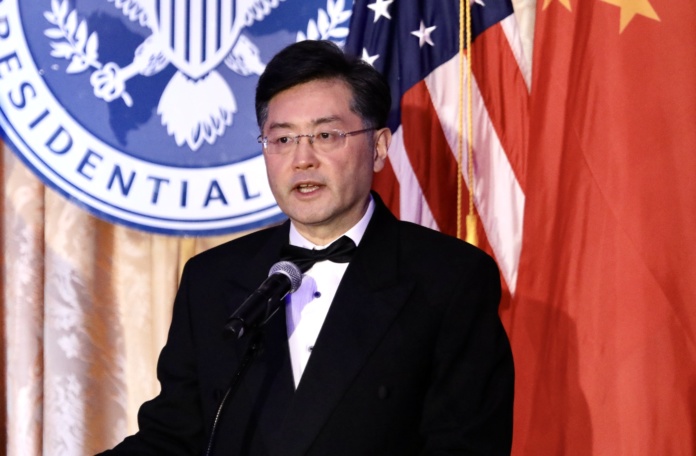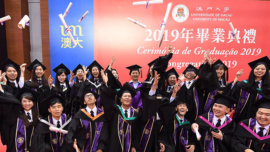After Qin Gang was named as the Foreign Minister of the People’s Republic of China (PRC) on December 20, 2022, he has been conducting a new kind of Chinese telephone diplomacy.
On January 9, 2023, Qin Gang had phone calls with Russian Foreign Minister Sergei Lavrov, Pakistani Foreign Minister Bilawal Bhutto Zardari, and South Korean Foreign Minister Park Jin. Qin told Sergei Lavrov that the China-Russia comprehensive strategic partnership had been deepened and both sides had built up their relations on the principles of non-alignment, non-confrontation, and non-direction toward any third party.
Qin then told Bilawal Bhutto Zardari that both China and Pakistan enjoy special relationships with high-level mutual trusts and interactions. As such, both sides would deepen their traditional friendship and forge a closer China-Pakistan community with a shared future.
Qin told Park Jin that China and South Korea are close neighbours with sound mutual relationships. Qin expressed his concern about the temporary restrictions imposed by the South Korean government on mainland Chinese visitors, and he hoped that South Korea would adopt a more objective and scientific attitude toward how China tackled COVID-19 and its variants.
On January 17, 2023, Qin Gang held a phone discussion with Malaysian Foreign Minister Zambry Abdul Kadir, saying that the year 2023 represents the 50th anniversary of the diplomatic relations between the two countries. Qin said that China is eager to promote bilateral relations in its Belt and Road initiative and maintain peace in the Asia-Pacific region. Qin added that the Malaysian government adopted a fair attitude toward how China tackled COVID-19 and its variants, and that the personnel of both sides should resume interactions soon. In response, Zambry said Malaysia attached great importance to its traditionally close relations with China and the promotion of bilateral ties through the Chinese Belt and Road initiative.
On January 20, Qin held a phone conversation with the Indonesian Foreign Minister Retno Marsudi. Qin said China is ready to work closely with Indonesia to build up a stronger China-Indonesia community with a shared future. He added that China fully supports Indonesia becoming the rotating president of ASEAN.
In addition, PRC enterprises would invest more and do business in Indonesia. Marsudi said that Indonesia looks forward to the consolidation of bilateral relations and that his country attaches great importance to the security of Chinese investment projects and to the visits of more Chinese tourists.
On January 30, Qin adopted blitzkrieg-style telephone diplomacy by having phone conversations with the Dutch Prime Minister and Foreign Minister Wopke Hoekstra, Saudi Arabian Foreign Minister Prince Faisal bin Farhan Al Saud, and Argentinian Foreign Minister Santiago Cafiero. In his phone talk with Hoekstra, Qin said that China looked forward to implementing the consensus reached by China and Holland, consolidating exchanges at all levels, and pushing for progress in the Sino-Netherlands comprehensive cooperative partnership. Moreover, China backs up the Netherlands in the areas of climate change, the maintenance of an open and orderly international trade environment rather than a fragmented one. Both foreign ministers talked about Japan’s decision to discharge nuclear-contaminated water into the ocean – a move that they saw as affecting human health and the marine environment.
At a time when Qin had the phone dialogue with Hoekstra, it was reported that Holland cooperated with the US and Japan to restrict the export of chips to the PRC. In response, Qin Gang in his phone dialogue with Hoekstra said that the international trade environment should maintain the stability and openness of the international logistics supply chain rather than retaining its “fragmented and chaotic” nature.
Qin’s discussion with Faisal included the former’s emphasis on President Xi Jinping’s recent visit and attendance at the first Sino-Arab States Summit and the China-Gulf Cooperation Council Summit. Qin said that China is eager to work with Saudi Arabi and bring their relations to a new height while strengthening relations through the China-Gulf Cooperation Council. In particular, China upholds the basic norms governing international relations, especially the principle of non-interference with international affairs.
In the Qin-Faisal dialogue, Qin mentioned the early construction of the China-Gulf Free Trade Zone and the mutual cooperation in energy, infrastructure projects, monetary and financial development, high tech projects and the logistics supply chain of the semi-conductor industry. Obviously, China is very eager to deepen trade, energy, infrastructure, and semi-conductor cooperation with the Gulf states—a move in conformity with the PRC’s Belt and Road initiatives and its eagerness to win the hearts and minds of more advanced and developed countries in the world.
As many Gulf states are rich in their resources and quite developed in their economic development, the idea of the China-Gulf Free Trade Zone deserves our attention. Naturally, if such a free trade zone is to develop, the internationalisation and widespread usage of Renminbi as a currency for economic transactions in China-Gulf relations will be anticipated.
During the phone talks with Cafiero, Qin remarked that both China and Argentina are good partners, adding that China is eager to work with Argentina to implement the consensus reached by the heads of state of both countries. Furthermore, both sides would carry out the tradition of having mutual respect, treating each other as equals, and achieving win-win cooperation while promoting the development of the Sino-Argentinian comprehensive strategic partnership.
To win the support of the Argentinian side, Qin Gang said that China supports Argentina’s bigger role in regional and international affairs.
On January 21, Qin had a phone discussion with the Afghanistan Foreign Minister Amir Khan Muttaqi, saying that China hopes the Afghanistan side would adopt stronger measures to protect the safety of Chinese personnel and projects in Afghanistan. In response, Amir Khan Muttaqi replied that Afghanistan would not tolerate any force to undermine the Chinese interests in Afghanistan and their friendly relations. Moreover, Afghanistan would resolutely fight against terrorism and protect the safety of the Chinese personnel and projects. In December 2022, a Chinese-invested hotel was attacked in Afghanistan, leading to three deaths and eighteen injuries.
While Qin added that China supports a more tolerant political structure in Afghanistan and a more moderate and stable internal and external policy, China is sympathetic to Afghanistan’s sufferings and supportive of the country’s social and economic development through developmental aid.
On February 2, 2023, Qin Gang called Mevlut Cavusoglu, the Foreign Minister of Turkey, expressing his hope that Turkey could and would attach importance to China’s concern about Xinjiang’s development. Mevlut Cavusoglu said that Turkey would adopt the one-China principle and that it would not blacken the image of China in dealing with the PRC’s internal affairs. Qin remarked that China appreciates Turley’s one-China policy and that it supports Turkey’s quest for its own path of development, the protection of its territorial integrity, sovereignty, and safety, as well as its pursuit of opposing external interference. Qin expressed his hope that China and Turkey would strengthen communication and coordination in the United Nations and other international organisations for the sake of protecting the interests of developing countries.
Mevlut Cavusoglu said that Turkey attaches great importance to its relations with China, and that both sides would deepen trade cooperation and international coordination. Moreover, Turkey would pursue its one-China policy and would not attack or blacken the image of China’s domestic affairs.
On February 2, 2023, Qin Gang had a phone discussion with the Japanese Foreign Minister, Hayashi Yoshimasa – the first dialogue between the two since Qin became the Chinese Foreign Minister. Qin remarked that peaceful coexistence and friendly cooperation are the correct choices of China and Japan and that these choices are the directions for Sino-Japanese relations in a new era. After all, 2023 represents the 45th anniversary of the Sino-Japanese peace and friendly agreement. As such, China grasps this opportunity to persist in the pursuit of mutual cooperative partners and mutually non-threatening nature, thereby reaching political consensus and deepening collaboration. Qin said that China hopes Japan can adopt an “objective” stance to deal with history and the question of Taiwan in a promising and circumspect manner.
In response, Hayashi Yoshimasa said that Japan would like to strengthen mutual communications and the interactions between the citizens of the two countries. He revealed later that he was invited by Qin Gang to visit China. However, Hayashi admitted that both Japan and China encounter many challenges, including the questions of the East Sea, South China Sea, Hong Kong, Xinjiang and Taiwan.
Under the circumstances in which Japan has forged a closer military relationship with not only the US but also India, Japan’s ideological affinity with the US naturally sees China as a real military and economic threat. Japan’s close relation with Taiwan has also made Tokyo worried about the evolution of Beijing-Taipei relations.
Still, both sides, as admitted by Hayashi, agreed that a constructive and safe relationship is the consensus of the leadership between Japan and China.
Japan’s increase in its military armament and capacity has become a response to not only the perception of the “China threat” but also the military build-up and nuclear capability of North Korea. Hayashi expressed Japan’s concern about the abduction of Japanese by North Korea, while Qing Gang agreed that China would cooperate with Japan on this matter.
During the telephone dialogue, Hayashi expressed a “strong” view of requesting China to adopt “responsible action” with regard to the Senkaku (Diaoyu Island in Chinese) Island.
Despite their opinion differences, it is wise for Japan and China to focus on issues of low-level politics, such as climate change, green economy, public health, youth exchange and interactions between the citizens of both countries.
On February 2, 2023, Qin Gang actually met the United Nations (UN) General Assembly’s President, Csaba Korosi, in Beijing. Qin said the UN must play a crucial role in global governance by speaking and acting impartially, safeguarding peace and security, standing up for fairness and justice, upholding multilateralism, abandoning ideological confrontation, and promoting mutual learning among civilizations. He added that China would continue to support the UN work.
In conclusion, PRC Foreign Minister Qin Gang has been adopting an intensive telephone diplomacy, calling his counterparts in Russia, Pakistan, South Korea, Malaysia, Indonesia, Holland, Saudi Arabia, Argentina, Afghanistan, Turkey, and Japan. His diplomatic dialogue with all these countries is characterised by a common pattern of firstly restating the common interests of China and the states concerned; secondly, the articulation and protection of the PRC interests in various countries; thirdly, the reiteration of China’s principles of non-interventionism, multilateralism, win-win cooperation, and the shared values of maintaining regional and world peace; fourthly the deepening of bilateral relations socio-economically and technologically under the umbrella of the Belt and Road initiative with the thrust of Chinese investment and business expansion; and finally, the quest for solutions to solve problems perceived by China and the states concerned. Clearly, the new Chinese Foreign Minister has been adopting an intensive and assertive telephone diplomacy that seeks to achieve China’s foreign policy objectives of consolidating strong relations with the existing friends, winning the hearts and minds of more friends in the world, maintaining regional and world peace, promoting the one-China principle and PRC’s economic and safety interests in various countries, and achieving a vision of “common destiny for the mankind” through the deepening of cooperation in the spheres of economic and sustainable development.





















